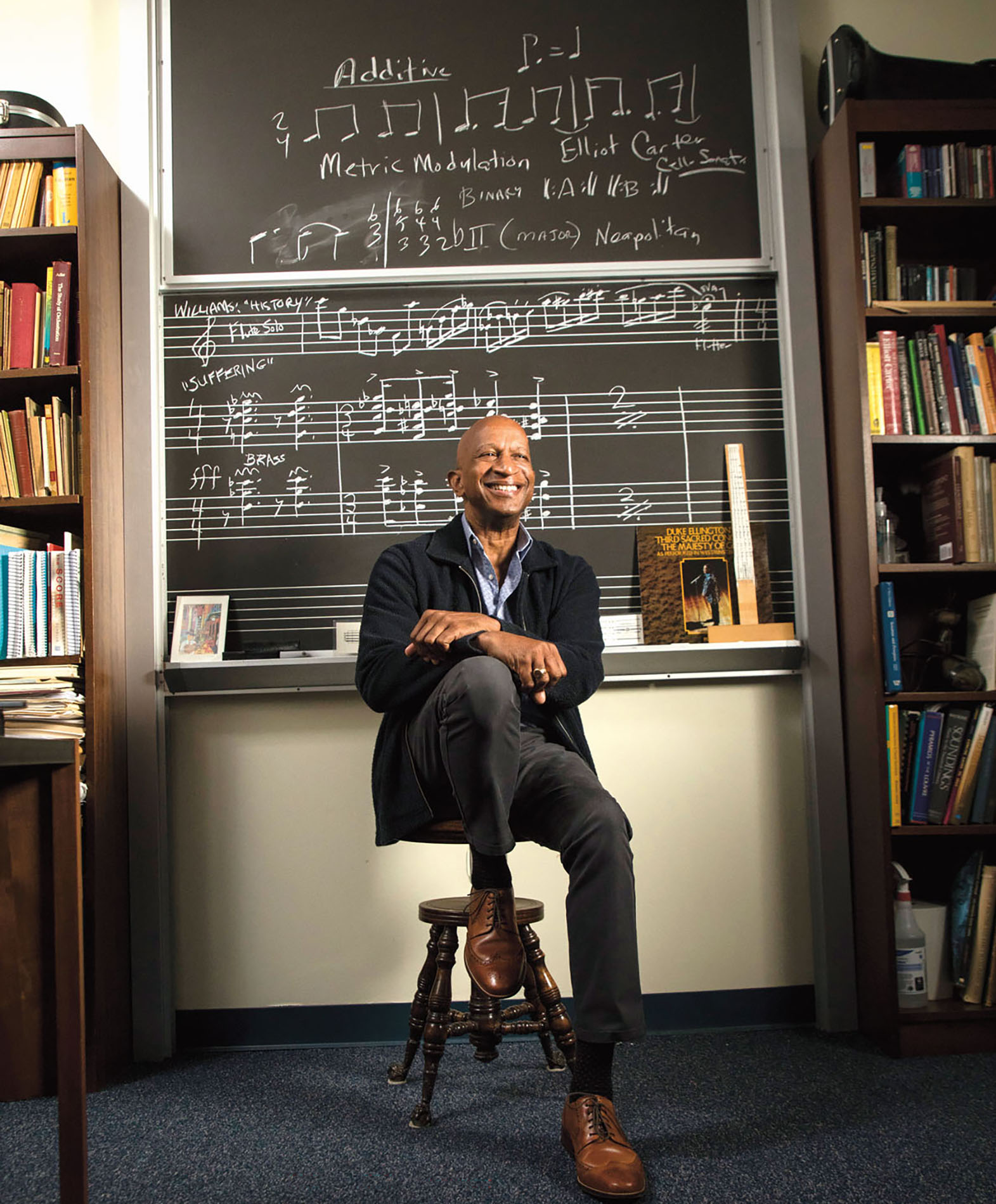During the COVID-19 lockdown, Duke professor of the practice of music Anthony Kelley ’87, A.M.’91 had time on his hands, and he ended up watching movies.
“I was just in this mode of watching documentaries,” he recalls from his office full of pianos, sheet music and computer screens. He found a documentary about jazz giant Mary Lou Williams, Duke’s first artist in residence. Williams taught students, directed performing groups and wrote music at Duke in her final years. Kelley reveres her.
But what stopped him in the documentary was Paul Bryan, director of the Duke Wind Symphony when Kelley was a student at Duke. The two started a steadfast friendship that lasted until Bryan’s death in 2021. Late in the documentary Kelley enjoyed seeing Bryan directing Duke students in 1981. In the scene Bryan says that Mary Lou couldn’t come to the rehearsal, so they should just play through some things to record them for her to listen to in the hospital, where she was dying of cancer.
At first, Kelley says, “It just kind of blew my mind” to see his old friend. But then he processed what he had seen: Bryan was directing the Wind Symphony in a piece of music Williams had written – but that, as far as he knew, did not exist. “I thought, my goodness – this is students reading. He’s got a score. So where’s this music? Like, why haven’t other people played this piece?
“And that’s exactly how it started.”
What started was months of research in which Kelley pawed through archives hither and yon seeking the forgotten manuscript. The search started with Verena Mösenbichler-Bryant, the current Wind Symphony director, whose office functions as the Wind Symphony archive.
“When Anthony and I actually searched my office for materials, which now was a year ago, I could already tell,” she recalls. “I mean, he had so much fire when looking for the piece. He was so driven and determined to find these fragments that were lost.”
Her office did not contain the score, so Kelley kept looking. He tried the Library of Congress and other archival sources. Then one day he shifted from Williams’ archives to Bryan’s. He dropped off a request for a box of Bryan’s papers with a librarian he had befriended at the Rubenstein Rare Book & Manuscript Library on campus.
“When I got back, she had this big smile on her face. She said, ‘I think we’ve got something you might like,’ and I was like ‘Here we go!’”
And there he went. The piece was in many fragments. The beginning was the most developed, but others had as little as a few bars of music lightly penciled in. He found clues where he could, seeking inspiration in historical presentations of jazz Williams used to perform. One biographer described Williams’ interest in horror movie soundtracks: “She had asked her assistant to take her to see the movie ‘Alien,’” Kelley says, which provided insight for the section now called “Suffering.” The “Ragtime” section, though, “was just like 16 bars of just clarinet writing, nothing else,” Kelley laughs. “And I was like, OK, thanks for the clues, I can make something out of that.”
He did. After the better part of a year he ended up with a six-segment composition. Thus Kelley premiered, four decades after her death, “History…,” a fully realized new piece of music by Mary Lou Williams.
Mösenbichler-Bryant loves the music. She also loves the generational collaboration. Kelley “was able to create a piece, a whole out of these fragments, and made it sound like her,” she says. “But what I also find beautiful in it is that Anthony's voice is in there; his voice did not get lost at all.”
The performers felt that same spirit of collaboration across the years. Pianist Chris Pattishall, a Durham native, has been an artist in residence at Duke, is a lifelong friend of Kelley’s and has long revered Mary Lou Williams.
“Having spent so much time investigating and learning and being drawn into Mary Lou's world, there's something very, very special for me about making sound, and specifically performing her songs,” Pattishall says. “In a room where I know – she made sounds in that room. I know that the walls absorbed and reflected sound waves that emanated from her. And so to be able to play her music in that same space is a very spiritual experience for me. And something that I feel deeply, deeply honored to be a part of.”
The Duke Wind Symphony plans to perform the composition again this fall. Until then, the premiere is available on YouTube, and Kelley demonstrates some of his choices in the DukeMag podcast, Devils & Details, at DukeMag.duke.edu.
